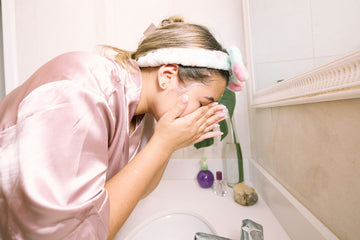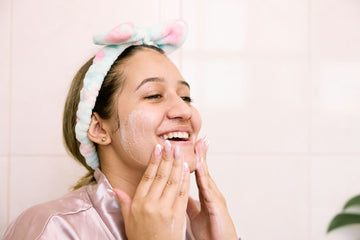I. Protecting Your Skin
Protect Yourself from the Sun to Prevent Skin Cancer
Use sunscreen with at least SPF 30 to shield your skin from harmful UV rays, which cause premature aging, sunburns, and increase the risk of skin cancer. For those with acne prone skin, it is crucial to select appropriate SPF products that do not exacerbate breakouts.
Wear protective clothing, sunglasses, and wide-brimmed hats when spending extended time outdoors. Seek shade, especially during peak sunlight hours between 10 AM and 4 PM. Avoid tanning beds and artificial UV sources, as they accelerate skin damage and increase the risk of melanoma.
Daily sun protection helps prevent fine lines, dark spots, and skin sagging caused by prolonged UV exposure.
Don’t Smoke
Smoking damages collagen and elastin, leading to premature wrinkles and a dull complexion. It also restricts blood flow, reducing oxygen and essential nutrients from reaching your skin. Quitting smoking can significantly improve skin health, restoring a more youthful, glowing appearance.
Smoking also increases the risk of skin cancer, particularly on the lips. If you need help quitting, consult a healthcare provider for resources and support.

II. Skin Care Routine
Step One: Cleanse and Exfoliate
Cleansing removes dirt, sweat, and impurities that accumulate on the skin throughout the day. Use a gentle, sulfate-free cleanser suitable for your skin type to avoid stripping natural oils. Exfoliating 1-3 times per week helps remove dead skin cells, unclog pores, and improve skin texture.
Choose a physical exfoliant (like a scrub with microbeads) for a manual polish, which refreshes and invigorates the skin. Dermatologists often endorse physical exfoliation as a safe and effective method for maintaining healthy skin.
Alternatively, opt for a chemical exfoliant (such as glycolic or lactic acid) for a deeper, non-abrasive exfoliation. Adjust your exfoliation frequency based on your skin type—sensitive skin should exfoliate less frequently, while oily skin benefits from regular exfoliation to prevent breakouts.
Step Two: Tone and Hydrate
Toners help restore the skin’s pH balance and remove residual impurities left after cleansing. Choose toners with hydrating ingredients (like hyaluronic acid for dry skin) or astringent properties (such as witch hazel for oily skin).
Hydration is essential for keeping the skin supple and reducing the appearance of fine lines. Simplifying your skincare routine and focusing on essential products can lead to healthier skin. Use a moisturizer suited for your skin type—gel-based for oily skin, rich cream for dry skin, and lightweight lotion for combination skin.
Consider adding a face mist to your routine for an extra layer of hydration throughout the day. Look for mists with aloe vera, rose water, or green tea to soothe and refresh the skin.
Step Three: Serums and Their Benefits
Serums are a powerhouse addition to any skincare routine, delivering a concentrated dose of active ingredients to target specific skin concerns. Incorporating the right serum can make a significant difference in your skin’s health and appearance.
Vitamin C serums are renowned for their ability to brighten and even out skin tone while providing antioxidant protection against environmental damage. If your goal is to achieve a radiant complexion, this is a must-have.
For those seeking intense hydration, hyaluronic acid serums are a game-changer. They lock in moisture, leaving your skin feeling plump and hydrated. This is especially beneficial for dry skin or during colder months when skin tends to lose moisture.
Retinol serums, derived from vitamin A, are celebrated for their anti-aging properties. They help reduce fine lines, wrinkles, and skin discoloration, promoting a smoother, more youthful appearance.
Niacinamide serums are versatile and beneficial for various skin types. They improve skin elasticity, reduce inflammation, and strengthen the skin barrier, making them an excellent choice for maintaining overall skin health.
Step Four: Moisturizer for Skin Health
Moisturizing is a non-negotiable step in any skincare routine, crucial for maintaining healthy, hydrated skin. Regardless of your skin type—whether it’s dry, oily, or combination—there’s a moisturizer out there for you.
Choosing a moisturizer that suits your skin type is essential. For oily skin, opt for a lightweight, gel-based moisturizer that won’t clog pores. If you have dry skin, a rich, creamy moisturizer will provide the hydration you need. Combination skin benefits from a balanced, lightweight lotion.
Moisturizers do more than just hydrate; they lock in the benefits of previous skincare steps, ensuring that active ingredients are absorbed and retained. Hydrating moisturizers can also help reduce the appearance of fine lines and wrinkles, leaving your skin looking smoother and more radiant.
Additionally, moisturizers provide an extra layer of protection against environmental stressors and pollution, which can otherwise damage your skin and accelerate aging.
Step Five: Importance of Sunscreen
Sunscreen is a cornerstone of any effective skincare routine, offering vital protection against harmful UVA and UVB rays. These rays can cause premature aging, skin cancer, and hyperpigmentation, making daily sunscreen application a must for maintaining skin health.
Choose a broad-spectrum sunscreen with an SPF of at least 30, and make it a habit to apply it every day, even on cloudy days. This simple step can prevent dark spots and hyperpigmentation, helping to keep your skin tone even and radiant.
Don’t forget to apply sunscreen to often-overlooked areas such as the ears, neck, and hands. These areas are just as susceptible to UV damage and deserve the same level of protection.

III. Lifestyle Tips for Healthy Skin
Good Eating Habits
A balanced diet plays a crucial role in maintaining clear, glowing skin. Include plenty of fruits, vegetables, lean proteins, and whole grains in your meals. Antioxidant-rich foods (such as berries, green tea, and dark chocolate) protect against environmental damage. Omega-3 fatty acids (found in fish, walnuts, and flaxseeds) help reduce inflammation and keep skin moisturized.
Limit processed foods, excessive dairy, and sugary snacks, as they can trigger acne breakouts and accelerate aging. Drinking collagen-boosting beverages like bone broth or green smoothies can also support skin elasticity and firmness.
Hydration and Sleep
Water is essential for maintaining skin elasticity and flushing out toxins. Aim to drink at least 8 glasses of water per day to keep skin hydrated. Herbal teas and water-rich foods (like cucumbers and watermelon) also contribute to hydration.
Sleep is another crucial factor in skin health. Aim for 7-9 hours of quality sleep per night to allow the skin time to repair and regenerate. Lack of sleep can lead to dark circles, puffiness, and dull skin. To enhance your beauty sleep, use a silk pillowcase to reduce friction and prevent wrinkles.
IV. Stress Relief and Skin Health
5 Stress Relief Sports to Boost Your Mood
Stress is a major contributor to skin issues such as acne, eczema, and premature aging. Engaging in stress-relieving activities can help improve skin health.
-
Yoga: Reduces inflammation, improves blood circulation, and promotes relaxation.
-
Walking or Running: Increases oxygen flow, leading to a brighter complexion.
-
Swimming: Hydrates and detoxifies the skin while reducing stress levels.
-
Dancing: Increases circulation, giving the skin a healthy glow.
-
Cycling: Helps flush out toxins and promotes a youthful complexion.
Regular exercise not only benefits your skin but also improves overall health and mental well-being.
V. Additional Tips
Face Mists and Why Add Them to Your Skincare Routine
Face mists are an underrated skincare essential that can refresh, hydrate, and protect your skin throughout the day. They help to set makeup, soothe irritated skin, and provide a burst of moisture when needed.
Look for face mists with natural ingredients like rose water, green tea, and chamomile to calm inflammation and balance the skin. Face mists containing hyaluronic acid or aloe vera help retain moisture, especially in dry or cold climates.
Spritz your face mist in the morning, midday, and before bedtime for maximum hydration benefits.
Common Skincare Mistakes to Avoid
Achieving healthy skin isn’t just about what you do—it’s also about what you avoid. Here are some common skincare mistakes and how to steer clear of them:
-
Not Removing Makeup Properly: Failing to remove makeup can lead to clogged pores, acne, and premature aging. Always cleanse thoroughly to ensure all makeup is removed.
-
Using Harsh Exfoliants: Over-exfoliating or using harsh exfoliants can strip your skin of its natural oils, leading to dryness and irritation. Opt for gentle exfoliants and limit use to 1-3 times per week.
-
Not Wearing Sunscreen Daily: Skipping sunscreen increases the risk of skin cancer and accelerates skin aging. Make sunscreen a daily habit, regardless of the weather.
-
Using Products Not Suitable for Your Skin Type: Using the wrong products can cause irritation, dryness, and other skin issues. Choose products tailored to your specific skin type for the best results.
-
Inconsistency in Skincare Routine: Inconsistent skincare routines lead to lackluster results and dull, unhealthy skin. Stick to a consistent routine to see the best improvements in your skin’s health and appearance.
By avoiding these common mistakes and following a well-rounded skincare routine, you can achieve and maintain healthy, glowing skin.
Frequently Asked Questions
How can I improve my skin beauty?
Follow a consistent skincare routine, eat a balanced diet, stay hydrated, and protect your skin from the sun. Get enough sleep and avoid smoking for a youthful, radiant complexion.
What are the best beauty tips?
Use sunscreen daily, cleanse and exfoliate regularly, drink plenty of water, manage stress, and get quality sleep. Stick to products suitable for your skin type and adjust your routine as needed.
What are the 5 basics of skincare?
-
Cleansing – Removes dirt, oil, and bacteria from the skin.
-
Exfoliating – Clears dead skin cells and unclogs pores.
-
Toning – Balances skin pH and preps for hydration.
-
Moisturizing – Locks in hydration and nourishes the skin barrier.
-
Sun Protection – Shields skin from harmful UV rays and prevents aging.
How can I get beautiful skin naturally?
Eat nutrient-rich foods, drink plenty of water, use natural skincare products, sleep well, and practice stress management techniques. Avoid harsh chemicals and unnecessary exposure to pollution.
Top 7 Beauty Tips for the Skin That Will Transform Your Routine Conclusion
Incorporating these beauty tips into your routine will transform your skin’s health and appearance.
Protecting your skin from the sun, maintaining a proper skincare regimen, following a healthy lifestyle, and managing stress will help you achieve radiant, youthful-looking skin.
Remember, consistency is key—small, daily habits will make a big difference in the long run.






